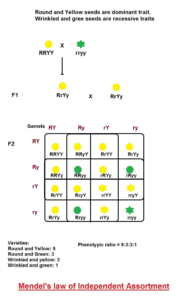Heredity and Evolution MCQ NCERT Class 10 Science Chapter 9
1. Gene pair that controls a character is called:
- a. Allele
- b. Trait.
- c. Genome.
- d. Gene pool.
2. A trait is a feature or character. Mendel choose contrasting character present in which plant?
- a. Rice.
- b. Pulse.
- c. Pea.
- d. Maize.
3. Variation in offspring is high in which case?
- a. A bacterium dividing asexually
- b. a self-pollinating plant
- c. A cross-pollinating plant
- d. A replicating Virus
4. Two gene mutations (A and B) occurred at the same time in a bacterium. After some gap of time, we see that gene A in the population is 60% while that of gene B is 10%. What can we infer from that?
a. Nature favors gene A, b. Nature is against gene B, c. Gene A causes fast division in the bacterium, d. cannot say.
5. A gene mutation is
a. Non-directional, b. Random c. Both d. None
6. Free and attached earlobes show:
a. Mendelian inheritance b. Multiple allelism c.Co-dominance d. Complex inheritance.
7. Mendel used the term “_ _ _ _ _ _ ” to show the law of dominance in peas, which we call now genes.
a. seed, b. factor, c. element d. Thing.
8. A plant with genotype Rr will yield _ _ types of gametes.
- a. Two (R, and r)
- b. One (R only)
- c. One (r only)
- d. None
9. A plant with genotype RrTt will yield _ _ types of gametes.
- a. Two (RT, and rt)
- b. Four (RT, Rt, rT, and rt)
- c. Two (Rr and Tt)
- d. None.
10. A plant with genotype RrTtYY will yield _ _ types of gametes.
- a. 1
- b. 2
- c. 3
- d. 4
11. A round seed is a _ _ _ _ trait while the green seed is a _ _ _ _ trait respectively.
- a. dominant, dominant,
- b. dominant, recessive,
- c. recessive, recessive,
- d. recessive, dominant.
Heredity and Evolution MCQ NCERT Class 10 Science Chapter 9
12. Presence of only one trait from contrasting traits in f1 progeny is:
- a. Incomplete dominance
- b. Co-dominance
- c. Dominance
- d. None.
13. Which ratios among these f1 progeny following show law of dominance?
- a. 1:1
- b. 3:1
- c. 1:2:1
- d. 9:3:3:1


- a. 1:1
- b. 3:1
- c. 1:2:1
- d. 9:3:3:1
15. A round seed on cross-pollination with pure round seed yield wrinkled seeds. Then the possible genotypic ratio of round seed is:
- a. RR
- b. Rr
- c. rr
- d. None.
16. A phenotype is a:
- a. trait/character
- b. gene
- c. chromosome
- d. none
17. 3:1 ratio in f2 generation in Law of dominance is a…
a. Phenotypic ratio
b. Genotypic ratio
c. Genotypic and phenotypic ratios are the same in the f2 generation.
d. None.
18. (3:1)2 is…
a. 3:1
b.9:1
c. 9:3:3:1
d. none
19. The Law of dominance shows that…
- a. A character is dominant while another is recessive.
- b. F1 progeny only show the dominant trait.
- c. The dominant character expresses itself in a 3:1 phenotypic ratio in f2.
- d. All.
20. Alleles of a gene get segregated during gamete formation in a flower. This segregation is independent of any other gene pair. This is :
- a. Law of dominance.
- b. Law of segregation.
- c. none
- d. Both.
21. A test cross is:
- a. Crossing an unknown variety with another unknown variety.
- b. Crossing a known variety with another unknown variety.
- c. Crossing an unknown variety with another recessive variety.
- d. None.
22. Why Mendel chooses pea to study genetics.
- a. Pea has multiple contrasting characters.
- b. Pea yields numerous seeds per generation which help in correct averaging.
- c. They have a short life span so assessment takes a short time.
- d. All.
23. An example of multiple allelism is:
- a. Human blood group.
- b. The eye color of drosophila.
- c. Sickle celled RBC.
- d. All.
24. Which blood group shows co-dominance?
- a. A
- b. B
- c. AB
- d. O
25. Which variation among these will pass into future generations?
a. Somatic cell mutation.
b. Germinal cell mutation.
c. Mutation in a vegetative propagating plant.
d. b & c.
See also:
How do Organisms Reproduce MCQ.
Chemical Reactions and Equations MCQ.
Answers:
| 1 | a | 6 | d | 11 | b | 16 | a | 21 | c |
| 2 | c | 7 | b | 12 | c | 17 | a | 22 | d |
| 3 | c | 8 | a | 13 | b | 18 | c | 23 | d |
| 4 | d | 9 | b | 14 | d | 19 | d | 24 | c |
| 5 | d | 10 | d | 15 | b | 20 | b | 25 | d |
Heredity and Evolution MCQ NCERT Class 10 Science Chapter 9
Ref: Chapter 9 NCERT.